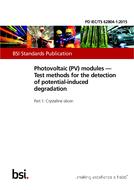Click here to purchase
BS PD IEC/TS 62804-1:2015 defines procedures to test and evaluate the durability of crystallinesilicon photovoltaic (PV) modules to the effects of short-term high-voltage stress includingpotential-induced degradation (PID). Two test methods are defined that do not inherentlyproduce equivalent results. They are given as screening tests – neither test includes all thefactors existing in the natural environment that can affect the PID rate. The methods describehow to achieve a constant stress level.
The testing in this Technical Specification is designed for crystalline silicon PV modules withone or two glass surfaces, silicon cells having passivating dielectric layers, for degradationmechanisms involving mobile ions influencing the electric field over the silicon semiconductor,or electronically interacting with the silicon semiconductor itself. This Technical Specificationis not intended for evaluating modules with thin-film technologies, tandem, or heterostructuredevices.
This Technical Specification describes methods to measure the module design’s ability towithstand degradation from system voltage effects that manifest in the relatively short term.The testing in this Technical Specification does not purport to examine certain combinedeffects that may occur over longer periods of time in modules such as encapsulation failure,which could lead in turn to rapid moisture ingress and electrochemical corrosion. ThisTechnical Specification does not incorporate illumination of the module that can affect the rateof degradation.
The test methods are designed to measure PID sensitivity and will give results according tothe stress levels and the module grounding configuration inherent to the respective tests.Because stress method (a), testing in an environmental chamber, employs a non-condensinghumidity level to serve as a conductive pathway to electrical ground, it frequently applies lessstress toward the centre of the module face and the PID effect is concentrated toward themodule edges as a result. Stress method (b), contacting the surfaces with a groundedconductive electrode, evaluates cell sensitivity and some effects of the component packagingmaterials such as glass and encapsulant resistivity, but does not differentiate the effects ofsome construction methods of mitigating PID, for example, the use of rear rail mounts, edgeclips, and insulating frames.
The actual durability of modules to system voltage stress will depend on the environmentalconditions under which they are operated. These tests are intended to assess PV modulesensitivity to PID irrespective of actual stresses under operation in different climates andsystems.
Cross References:
IEC 60068-2-78:2012
IEC 60410
IEC 61215:2005
IEC 61730-2:2004
ISO/IEC 17025
All current amendments available at time of purchase are included with the purchase of this document.
Product Details
- Published:
- 09/30/2015
- ISBN(s):
- 9780580915635
- Number of Pages:
- 20
- File Size:
- 1 file , 1.2 MB
- Product Code(s):
- 30329759, 30329759, 30329759
